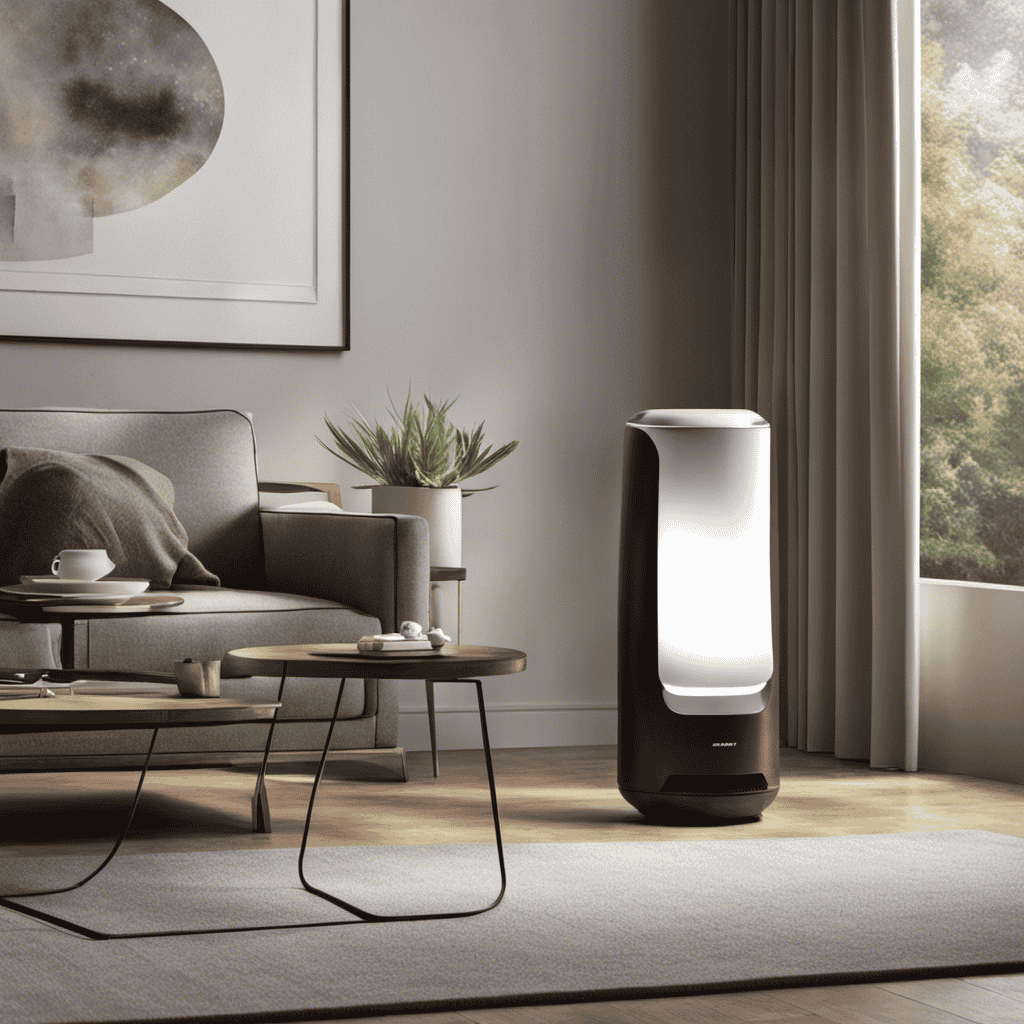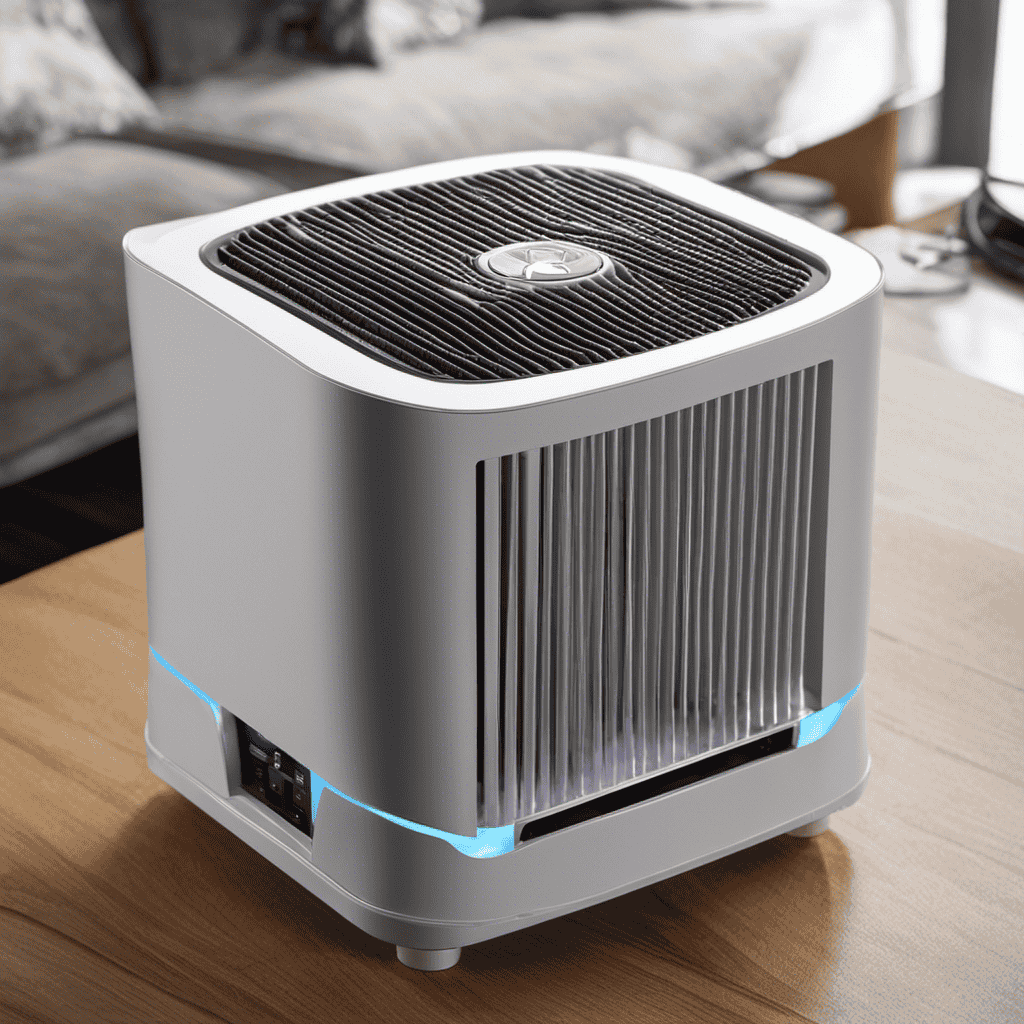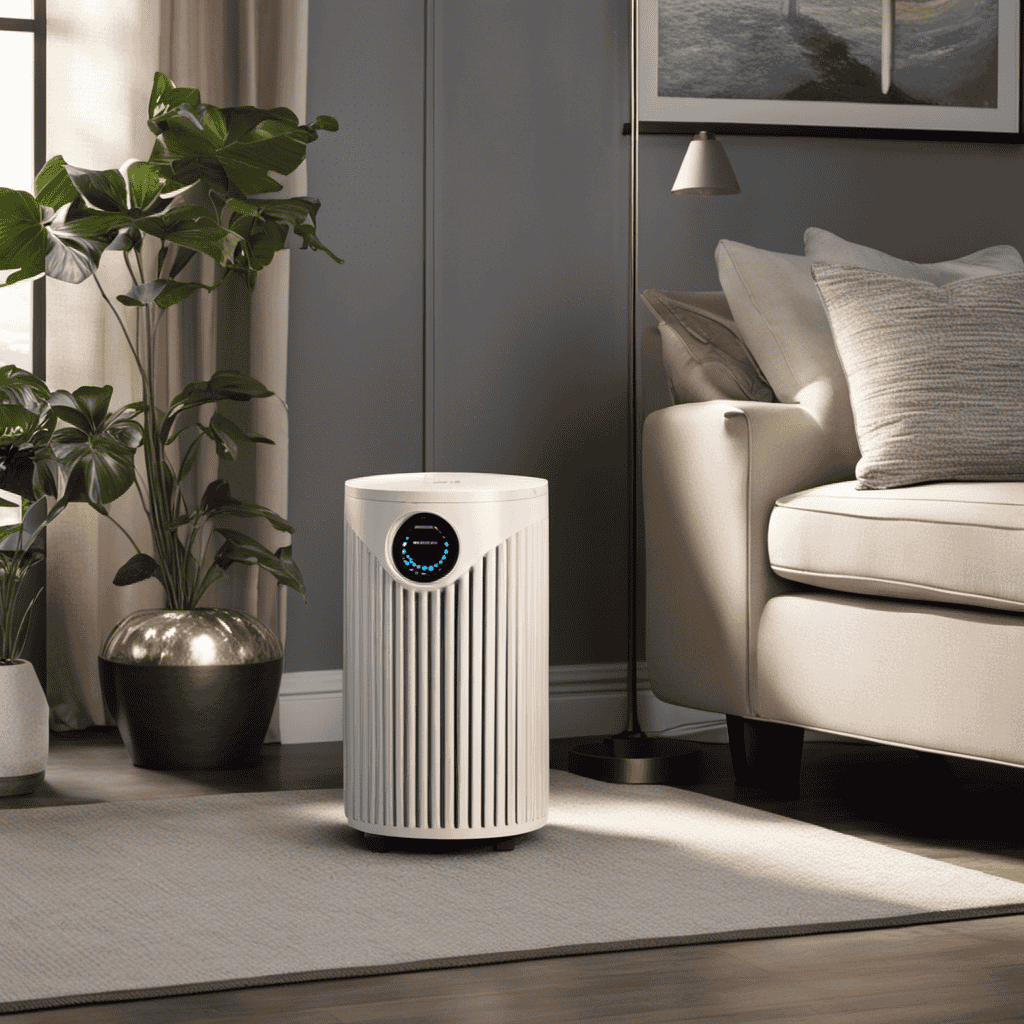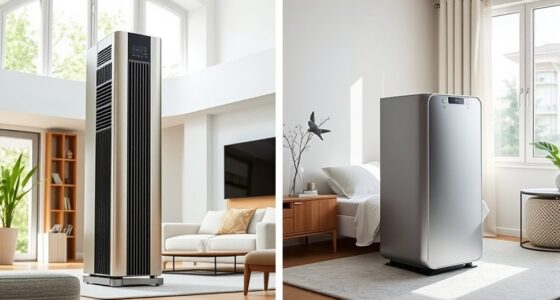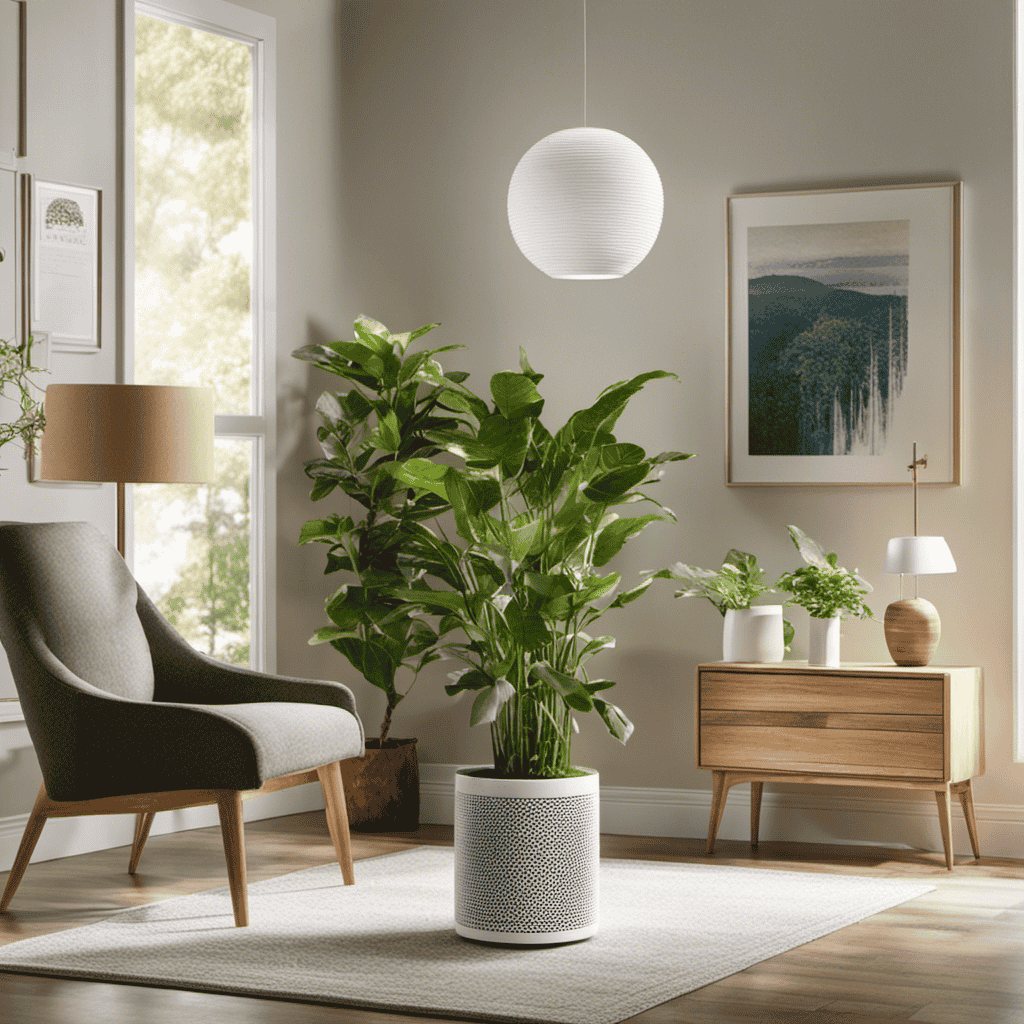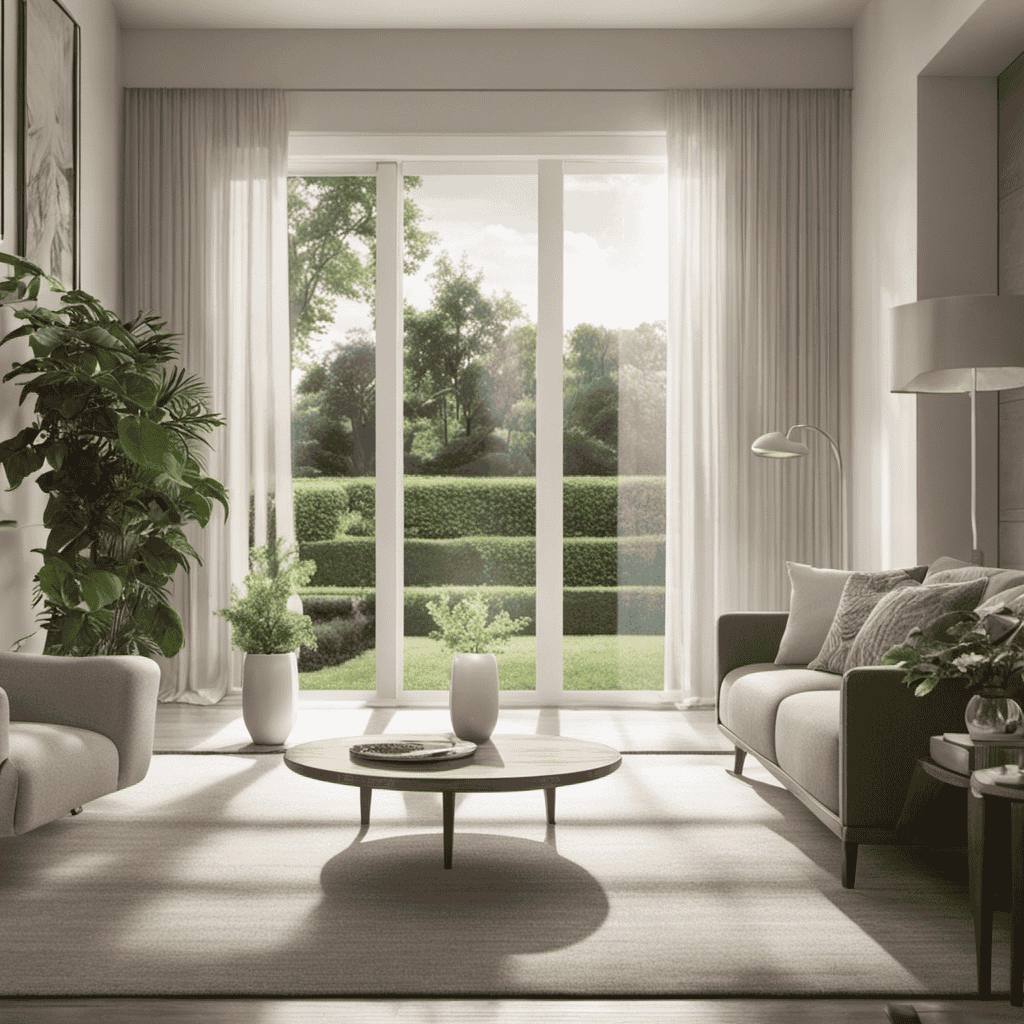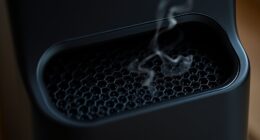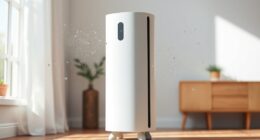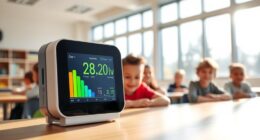I’ve continually been curious about the amount of electricity consumed by my 120v Hepa air cleaner.
Did you know that the average American household spends about 9% of its energy consumption on appliances like air purifiers?
In this article, we’ll delve into the power consumption of 120v Hepa air purifiers, exploring the factors that affect their electricity usage, estimating energy costs, comparing different models, and providing tips to reduce power consumption.
So, let’s dive in and uncover the truth behind the energy usage of these devices!
Key Takeaways
- Average American households spend about 9% of energy consumption on appliances like air purifiers.
- Factors affecting electricity usage of 120v Hepa air purifiers include room size, fan speed, filter type, timer settings, and energy-efficient technology.
- Estimating the energy cost of running a 120v Hepa air purifier involves calculating energy usage and multiplying it by the cost per kilowatt-hour charged by the utility provider.
- To reduce power consumption, adjust fan speed, utilize the timer function, and consider energy-efficient alternatives to 120v Hepa air purifiers.
Understanding the Power Consumption of 120v Hepa Air Purifiers
Understanding the power consumption of 120v Hepa air purifiers can help consumers make informed decisions about their energy usage. These devices play a crucial role in improving indoor air quality by removing pollutants and allergens.
However, they also consume electricity, which can have an impact on electricity bills. It is important to consider the energy-saving features of these air purifiers to minimize their energy consumption.
Many modern models come with features such as programmable timers, sleep modes, and sensors that adjust the fan speed based on air quality. These features not only help in reducing power consumption but also contribute to cost savings.
Factors Affecting the Electricity Usage of 120v Hepa Air Purifiers
One of the factors that affects the electricity usage of 120v HEPA air purifiers is the size of the room. The larger the room, the more power the air purifier will need to effectively clean the air.
However, there are other factors that can also impact the electricity usage of these devices. Here are four key factors to consider:
-
Fan speed: Higher fan speeds require more power to operate, so adjusting the fan speed can help conserve energy.
-
Filter type: Some air purifiers have power saving features that allow for the use of lower power settings when the air quality is already good.
-
Timer settings: Using the timer feature can help reduce electricity usage by automatically turning off the air purifier when it’s not needed.
-
Energy efficient technology: Choosing an air purifier that utilizes energy efficient technology can significantly reduce electricity consumption.
By understanding these factors, you can make informed decisions to optimize the electricity usage of your 120v HEPA air purifier and save on energy costs.
Now, let’s dive into estimating the energy cost of running a 120v HEPA air purifier.
Estimating the Energy Cost of Running a 120v Hepa Air Purifier
Estimating the energy cost of running a 120v HEPA air purifier can be done by calculating the total hours of usage and the wattage of the device. To estimate the energy usage, multiply the wattage of the air purifier by the number of hours it is used per day.
For example, if the air purifier has a wattage of 50W and is used for 8 hours a day, the daily energy usage would be 400 watt-hours (50W x 8 hours).
To calculate the electricity cost, multiply the daily energy usage by the cost per kilowatt-hour (kWh) charged by your utility provider.
Comparing the electricity consumption of different 120v HEPA air purifier models can help determine which model is more energy-efficient and cost-effective in the long run.
Now, let’s explore how the electricity consumption of different 120v HEPA air purifier models can vary.
Comparing the Electricity Consumption of Different 120v Hepa Air Purifier Models
Comparing the energy consumption of different 120v HEPA air purifier models can reveal variations in efficiency and cost-effectiveness. When considering which model to purchase, it is important to understand HEPA filters and compare filter replacement costs. Here are four factors to consider when comparing the electricity consumption of different models:
-
Wattage: Look for models with lower wattage ratings, as they consume less electricity.
-
Fan Speeds: Models with multiple fan speeds allow you to adjust the power consumption based on your needs.
-
Timer Function: A timer function can help you schedule the operation of the air purifier, reducing unnecessary energy consumption.
-
Energy Star Certification: Look for models that are Energy Star certified, as they meet strict energy efficiency guidelines.
By considering these factors, you can choose a 120v HEPA air purifier that not only provides clean air but also minimizes energy consumption.
Now, let’s explore some tips to reduce the power consumption of your 120v HEPA air purifier.
Tips to Reduce the Power Consumption of Your 120v Hepa Air Purifier
To lower the power consumption of your 120v HEPA air purifier, try adjusting the fan speed and utilizing the timer function.
These energy-saving techniques can significantly reduce the amount of electricity your air purifier consumes while still maintaining its effectiveness.
Adjusting the fan speed allows you to control the airflow and power usage according to your needs. Lowering the fan speed not only reduces energy usage but also reduces noise levels.
Additionally, utilizing the timer function allows you to set specific periods for the air purifier to operate, ensuring that it is only running when needed. This helps to further reduce energy consumption and minimize wastage.
Exploring Energy-Efficient Alternatives to 120v Hepa Air Purifiers
When considering air purifiers, it’s important to explore energy-efficient alternatives. Energy-efficient purifiers not only reduce power consumption but also contribute to long-term cost savings.
In this discussion, we will compare the power consumption of different air purifiers and analyze the potential cost savings that can be achieved by opting for energy-efficient models.
Energy-Efficient Purifiers
If you’re searching for an energy-efficient purifier, consider how much electricity a 120V HEPA air purifier uses. Energy-saving features are essential to reduce electricity consumption and lower your carbon footprint.
Here is a comparison of energy usage between a 120V HEPA air purifier and other common household appliances:
-
120V HEPA air purifier: On average, a 120V HEPA air purifier consumes around 20-50 watts of electricity per hour, depending on the model and settings. Some models also offer energy-saving modes to further reduce power consumption.
-
Refrigerator: A typical refrigerator consumes approximately 150-250 watts per hour. Energy-efficient refrigerators are designed to minimize energy usage and can save up to 15-20% compared to older models.
-
Laptop: Laptops typically use around 20-60 watts per hour, depending on the tasks being performed. Using power-saving features, such as putting the laptop to sleep when not in use, can further reduce energy consumption.
-
Incandescent light bulb: An incandescent light bulb consumes about 60-100 watts per hour. Switching to energy-efficient LED bulbs can save up to 80% of electricity consumption while providing the same level of brightness.
Considering the energy-saving features and comparing energy usage can help you make an informed decision when choosing an energy-efficient purifier.
Power Consumption Comparison
In my research on energy-efficient purifiers, I found it essential to compare the power consumption of various models. By doing so, we can identify the most energy-saving options and understand their environmental impact.
Energy-saving tips for air purifiers include:
- Choosing models with lower wattage
- Utilizing timers or programmable settings to optimize usage
- Cleaning or replacing filters regularly
When comparing power consumption, it is crucial to consider both the fan and the filtration system. The fan is responsible for circulating air, while the filtration system removes pollutants. Some purifiers have multiple fan speeds and filtration settings, which can affect power consumption. Additionally, purifiers with Energy Star certification have undergone testing to meet specific energy efficiency requirements.
Long-Term Cost Savings
By considering long-term cost savings, we can make informed decisions about which energy-efficient air purifier to purchase. When it comes to air purifiers, investing in energy-saving strategies can provide numerous long-term benefits. Here are four reasons why energy-efficient air purifiers are worth considering:
-
Cost savings: Energy-efficient air purifiers consume less electricity, resulting in lower monthly energy bills and significant long-term savings.
-
Environmental impact: By reducing energy consumption, energy-efficient air purifiers help minimize carbon emissions and contribute to a greener, more sustainable future.
-
Extended lifespan: Energy-efficient models are often designed with high-quality components, leading to longer lifespans and fewer replacement costs in the long run.
-
Improved air quality: Energy-efficient air purifiers are equipped with advanced filtration systems, ensuring cleaner and healthier indoor air for you and your family.
Considering these factors, investing in an energy-efficient air purifier can provide both financial and environmental benefits in the long term.
Frequently Asked Questions
How Do I Determine the Power Consumption of My Specific 120v Hepa Air Purifier Model?
To determine the power consumption of my specific 120v HEPA air purifier model, I need to calculate its energy usage. This can be done by multiplying the power rating (in watts) by the number of hours the purifier is used.
Are There Any Specific Factors That Can Cause Higher Electricity Usage in a 120v Hepa Air Purifier?
There are several factors that can contribute to higher electricity usage in a 120v HEPA air purifier. By optimizing filter maintenance, adjusting fan speed, and using energy-saving modes, you can reduce power consumption.
Can Using a 120v Hepa Air Purifier Impact My Overall Electricity Bill Significantly?
Using a 120v HEPA air purifier can impact my overall electricity bill significantly. To determine the exact effect, I would need to compare its electricity usage with other appliances and consider its environmental impact.
Is There a Noticeable Difference in Power Consumption Between Different Brands or Models of 120v Hepa Air Purifiers?
In comparing power consumption, it is important to consider different brands and models of 120v HEPA air purifiers. Some models may be more energy efficient than others, resulting in noticeable differences in electricity usage.
Apart From Reducing the Power Consumption, Are There Any Other Benefits to Using Energy-Efficient Alternatives to 120v Hepa Air Purifiers?
Using energy-efficient alternatives to 120v HEPA air purifiers not only reduces power consumption but also provides energy savings and has a positive environmental impact. These benefits make them a wise choice for maintaining clean indoor air quality.
Does the Functioning of a HEPA Air Purifier Affect its Electricity Usage?
Yes, the efficiency of a hepa air purifier function does affect its electricity usage. A high-performing hepa air purifier will consume more power as it filters more air and removes particles. It is essential to consider the energy consumption of the unit when choosing a hepa air purifier.
Conclusion
In conclusion, understanding the power consumption of a 120v Hepa air purifier is crucial in managing energy usage and costs. Factors such as fan speed, filter type, and room size greatly influence electricity consumption.
On average, a 120v Hepa air purifier uses around 50-200 watts per hour, which can lead to an annual energy cost of $30-$120. Interestingly, a study found that using an energy-efficient model can reduce electricity consumption by up to 50%, resulting in significant savings.
Exploring energy-efficient alternatives is worth considering for those looking to minimize their environmental impact and electricity bills.
